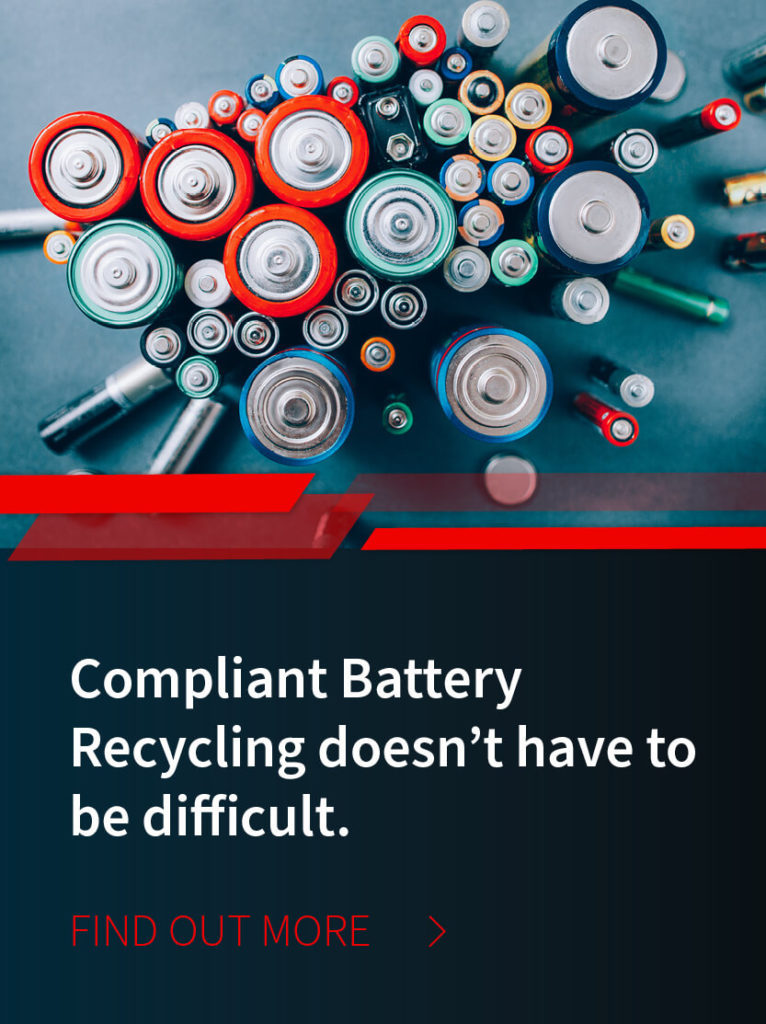
/ IN THIS BLOG
Universal waste is hazardous waste that is commonly generated by many businesses and households throughout the US. According to the Environmental Protection Agency (EPA), five different categories of waste can be categorized as universal waste. Standards for managing this type of hazardous waste are streamlined as compared to other forms of hazardous waste.
The EPA did this to try and encourage households and businesses to collect and recycle this waste. These standards also make it easier for transporters of the waste to comply with the regulations.
However, these regulations can be complicated. So, in this article, we will discuss what universal waste is, the types of establishments that generate it, and how it should be handled.
01 / Categories of Waste
There are five categories of materials that can be treated as universal waste. However, there are regulations that define what materials are included in these categories and when they are considered universal waste. The five categories are:
Pesticides: Generally, a substance or mixture of substances intended for preventing, destroying, repelling, or mitigating any pest or a substance for use as a plant regulator, defoliant, or desiccant.
Lamps: The bulb or tube portion of an electric lighting device.
Batteries: This category includes devices that have at least one electrically connected electrochemical cell, which is designed to receive, store, and deliver electric energy. Not all batteries that fit this definition are considered universal waste, including spent lead-acid batteries being managed under 40 CFR part 266 subpart G, batteries that have not been discarded, and batteries that are not hazardous waste.
Aerosol Cans: a non-refillable receptacle that contains a gas compressed, liquefied, or dissolved under pressure for which the only purpose is to expel a liquid, paste, or powder and fitted with a self-closing release device that allows the contents to be ejected by the gas.
Mercury-Containing Equipment: a device or part of a device in which elemental mercury is integral to its function. Some common examples of mercury-containing equipment are thermostats, manometers, pressure gauges, and mercury switches.
Sometimes, it can be difficult to determine whether or not certain items are considered universal waste. For instance, some businesses are unsure of how to dispose of tritium exit signs. These signs glow in the dark because they are radioactive isotopes and do not require batteries or electricity. These signs are not universal waste. Instead, they must be transferred to a special licensee for disposal. The EPA does give some guidance on this topic.
02 / Is E-Waste Universal Waste?
E-waste is not one of the categories of universal waste, according to the EPA. Instead, the EPA considers e-waste to be a subset of used electronics. This does not mean this waste can always be disposed of in landfills. In many cases, e-waste is regulated because some of the components are considered hazardous. Additionally, some states, including Arkansas, California, Colorado, and Connecticut, consider it universal waste.
03 / Regulated Participants in the Universal Waste System
There are four different generators of universal waste that are regulated participants in the universal waste system. These are:
Small quantity handlers: These participants accumulate under 5,000 kg of universal waste.
Large quantity handlers: These handlers accumulate at least 5,000 kg of universal waste.
Universal waste destination facilities
Universal waste transporters
It is important for large-quantity handlers of universal waste to obtain an EPA ID number. If you are a large-quantity handler, you must also send a notification in writing that contains:
A statement that your facility is a large quantity handler of universal waste.
Your facility’s name.
The street and mailing addresses of your facility.
The name and phone number of the individual who is in charge of managing the universal waste at your facility.
The types and quantities of universal waste being managed by your facility.
04 / Regulations Covering Universal Waste
Universal waste generally can be stored for as long as a year without the need to have it shipped by a hazardous waste transportation company or with a manifest. Additionally, businesses do not have to count this waste toward their generator category. However, this does not mean this waste is not regulated. Businesses are required to manage universal waste in such a way as to ensure it will not be released into the environment. The regulations determining the handling of this waste are determined by the size of the handler and the type of waste. Here is some basic information about these regulations.
05 / Storing and Disposing of Universal Waste
A small quantity handler of universal waste can store less than 11,000 lbs of universal waste for a year without obtaining a permit. In contrast, a large quantity handler may store an unlimited amount of universal waste for a year. However, both of these handlers must have the ability to prove a recycling market for the waste to store it beyond a year. There are also requirements concerning labeling the waste. Additionally, universal waste must be managed at facilities that are designated for or allowed to receive hazardous waste. This means the waste must be managed by specified facilities and not simply sent to a landfill.
These facilities must also respond to releases. This means a large handler must contain any release or residue of a universal waste. They must also determine whether or not any material that results from the release of the universal waste is hazardous waste.
06 / Labeling Waste
Both small-quantity and large-quantity universal waste handlers must comply with federal labeling requirements. These requirements are the same for both of these handlers. Waste handlers must mark the label with the date the material became waste and when they received it from another handler. It is important that the waste is not marked as hazardous waste. This would cause it to be subject to stricter regulations. Here are some additional labeling requirements.
Batteries: Universal waste batteries or the container they are stored in must be labeled “Waste Batteries,” “Universal Waste-Batteries,” or Used Batteries.”
Pesticides: Pesticides are required to be labeled “Universal Waste-Pesticide.” Tanks or other vessels that contain recalled pesticides must have the original label that was on the product when purchased.
Mercury-containing products: These products have to be labeled with one of these phrases: “Universal Waste-Mercury Containing Equipment,” Used Mercury-Containing Equipment,” or “Waste Mercury-Containing Equipment.” If the waste consists only of mercury thermometers, it could be labeled “Universal Waste-Mercury Thermostats,” “Used Mercury Thermostat(s),” or “Waste Mercury Thermostat(s).”
Lamps: Lamps or the container they are in must be marked “Universal Waste-Lamps,” “Used Lamps,” or “Waste lamps.”
Universal Waste Aerosol Cans: Each aerosol can, or the container they are in is required to be marked “Universal Waste-Aerosol Cans,” “Used Aerosol cans,” or “Waste Aerosol Cans.”
07 / Transporting Universal Waste
The rules for transporting universal waste are not as strict as those for hazardous waste. Universal waste generators are not required to have a waste manifest. However, large quantity universal waste generators do need to maintain shipping records. Here are some additional regulations concerning the transportation of universal waste.
Small and large handlers of universal waste become universal waste transporters during occasions when they self-transport waste. Therefore, they must comply with all relevant Department of Transportation regulations.
Universal waste handlers must make sure that when they are sending a shipment to another universal waste handler that this handler must agree to receive it.
Both small and large handlers of this waste are not permitted to transport universal waste to a place other than a destination facility, a foreign destination, or another universal waste handler.
A destination facility also has the option to ship its waste to a destination facility, a foreign destination, or another universal waste handler.
If a universal waste handler is handling universal waste that is also classified as hazardous waste, the handler must treat it as hazardous waste under Department of Transportation regulations.
08 / MCF Handles and Accepts All Forms of Waste
Although universal waste may not have the potential impact of hazardous waste, it still is regulated and some of these guidelines can become complicated. Because it’s essential to comply with these regulations to avoid penalties, as well as protect people and the environment, it’s crucial to partner with an experienced waste solution expert like MCF. Here at MCF, we can help you determine what is universal and how to best manage it. MCF is equipped to accept all forms of waste and help ensure you comply with all regulations concerning universal waste. Reach out to learn more about how we can help streamline your waste removal.
Robert Losurdo
President, COO








